What the latest science says about caffeine’s influence on your heart, memory, sex life, and exercise performance.
Americans are jolted with caffeine. On average, about 80% of adults take some form of caffeine every day, according to the FDA, usually from coffee, tea, soda, or energy drinks.
But does all that caffeine have any effect on your health — either good or bad? “While caffeine can give you a temporary mental and physical boost, its impact depends on how much you consume and the source,” says Dr. Stephen Juraschek, an internal medicine specialist at Harvard-affiliated Beth Israel Deaconess Medical Center.
A stimulating effect
Caffeine is a natural stimulant. Its main effect is on the central nervous system, where it can increase alertness and provide a needed boost when you are tired.
Caffeine’s effect peaks within an hour after consumption, and the body eliminates half of it within about four to six hours. Yet, how people react to caffeine varies depending on their sensitivity and how quickly it is digested.
“This is why some people can get a jolt from a small cup of coffee, while others can drink several cups and feel little, if anything,” says Dr. Juraschek. “It’s also possible that your body can adjust to how it reacts to caffeine the more you consume.”
It’s this variation that makes pinpointing caffeine’s influence on health a challenge. Still, science has shown some intriguing findings. For example:
Heart. High doses of caffeine can temporarily raise your heart rate and blood pressure, which may pose dangers for some people with heart disease. Yet regular consumption does not disrupt your heart’s rhythm enough to create the dangerous irregular pattern known as atrial fibrillation, according to a study in the January 2016 Journal of the American Heart Association.
Memory. Some research has suggested that caffeine may protect against dementia, including Alzheimer’s disease. One observational study in the Dec. 14, 2016, issue of The Journals of Gerontology: Series A found that adults ages 65 and older who took an average of 261 milligrams (mg) of caffeine a day (about the amount in two to three 8-ounce cups of coffee) for 10 years reported fewer dementia symptoms compared with those who consumed an average of 64 mg daily (the amount in a little more than half-cup of coffee). Still, it’s not understood whether caffeine, or other nutrients in coffee like antioxidants or some combination, is at play.
Erectile function. Regular caffeine intake may improve erectile dysfunction (ED), suggests a 2015 study in the journal PLOS ONE. Researchers compared daily caffeine intake and rates of ED in men who were part of the National Health and Nutrition Examination Survey. They found that those who consumed daily caffeine equal to two to three cups of coffee were 42% less likely to report ED compared with those who drank less, and that the effect applied even to men who were overweight or had hypertension. The connection may be related to caffeine’s ability to increase blood flow, but more research is needed.
Exercise. Many studies have found that a jolt of caffeine can improve athletic endurance and reduce fatigue. The amounts often studied range from about 225 mg to 600 mg, taken about an hour beforehand. Yet, much of the research involves high-level athletes, and the type of exercise tends to vary, says Dr. Juraschek, so it’s not clear exactly how caffeine may help the average person. “Consuming some caffeine before hitting the gym may work for some, but not for others,” he says. “It doesn’t hurt to try, but be realistic that it probably won’t make a huge impact on your results.”
Lose the energy drinksSome research has shown that popular energy drinks can cause a dangerous jolt to your cardiovascular system. A small study in the April 26, 2017, JAMA found that healthy people who consumed a 32-ounce energy drink that contained 320 mg of caffeine and 108 grams of sugar were more likely to have an abnormal electrocardiogram after two hours and mildly elevated blood pressure after six hours. |
Watch your intake
Overall, for most people, consuming caffeine poses no serious health risk if taken within safe amounts, says Dr. Juraschek.
People who have never had a heart attack or keep their blood pressure well controlled should consume no more than 400 mg per day, which is the amount found in about four cups of coffee or up to 10 cups of black tea.
“This amount is considered safe and isn’t linked to any long-term effect on blood pressure or heart attack or stroke risk,” says Dr. Juraschek.
However, if you’ve had a heart attack or been diagnosed with heart disease, you should keep your dosage to about half that per day, says Dr. Juraschek.
Your source of caffeine matters, too. Coffee and tea are great because they also contain some disease-fighting antioxidants, but you want to avoid stirring in too much cream and sugar, which add extra calories and fat.
Also skip the soda, or at least reduce your intake, as it often contains very high amounts of caffeine in a single serving and is full of sugar and other unhealthy additives.
Image: © sergeklein/Getty Images
Subscribe to Harvard Health Online for immediate access to health news and information from Harvard Medical School.
Disclaimer:
As a service to our readers, Harvard Health Publishing provides access to our library of archived content. Please note the date of last review on all articles. No content on this site, regardless of date, should ever be used as a substitute for direct medical advice from your doctor or other qualified clinician.
